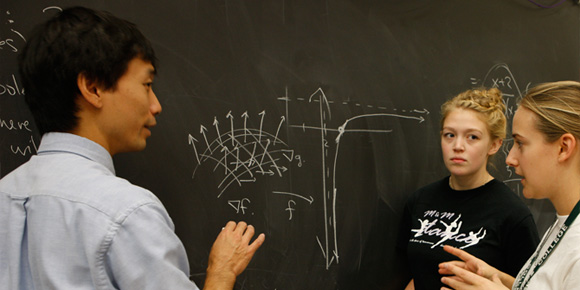
Kiley Lawrence ’14 says her class on women and math “positively changed how I think about myself as a female student of the sciences.”
“This is in no way a math class. It’s a philosophy class, a biology class, a sociology class, and a gender and women’s studies class elegantly combined to form something completely new,” says Kiley.
Winston Ou, associate professor of math, teaches the class “Women, Math, and Superstitions,” one of several small seminars offered through Core III, a rigorous, three-semester interdisciplinary academic program unique to Scripps College. The course examines the gender gap in science and math.
The Core III seminars are the third and final semester of Scripps’ signature academic program. Students are expected to speak on specialized interdisciplinary topics related to their self-designed projects and research. The courses challenge students to think analytically and critically.
“This class has provoked a distinct sense of control and capability that I feel every student must experience,” says the 19-year-old biophysics major and secular studies minor. “It has changed the way I approach problems in every field. It has made me a better student.”
Kiley used this experience as a foundation for her final Core III project. She and her fellow scholars created a series of online lectures with examples of creative techniques to teach third- and fourth-grade math.
“Rather than teach elementary math sequentially, we created a series of video lectures emphasizing the interconnectedness of fundamental math concepts. We kept in mind the differences in learning styles, the importance of utilizing a strong conceptual framework to explain algorithms and procedures, and perhaps most importantly, we emphasized math has a rational basis,” Kiley says.
A select number of the student videos will be posted online and made available to the public.
“How many times in elementary school or high school were you presented with a mathematical procedure and never thought to question, ‘Why?'” Kiley asks. “That shouldn’t be how math is taught. If elementary school curricula can be redesigned to promote academic exploration, students will be better prepared to look at unknown problems strategically.”
And, to solve them.

